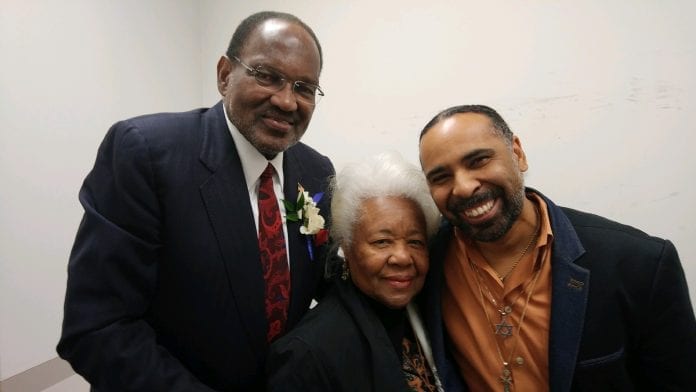by Harlan McCarthy, Special to The New Tri-State Defender
Music visionary Al Bell – this year’s recipient of the Authur S. Holman Lifetime Achievement Award – still lives on words of inspiration embraced by renowned motivational speaker Zig Ziglar and passed along to Bell by Dr. Martin Luther King Jr.
“It’s your attitude, not your aptitude, that gets you altitude.”
Bell, former chairman of Stax Records, shared his resolve on an evening (Feb. 1) largely focused on him. He was presented the Holman Achievement Award by the University of Memphis Black Student Association at the opening reception for Black History Month in the University Center Theatre.
The achievement award was created in 1991 and named after former dean Holman in 1996. Holman was on hand for the salute to Bell, as were Bell’s wife, Linda Mae Purifoy, and other family members, members of the Memphis State Eight (the first African-American students), friends such as Songwriter Hall of Fame inductee David Porter, and UofM students and administrators.
Alvertis Isbell was born on March 15, 1940, in Brinkley, Ark., where he was a high school disc jockey and served as president of the audio-visual club. He attended Philander Smith College and served as a student teacher for the Dr. King-led Southern Christian Leadership Conference.
Bell moved to Memphis to work at WLOK, where he met Stax Records co-founder Jim Stewart. Deanie Parker, Stax’s first publicist and former president and CEO of Soulsville Foundation, noted Bell’s impact.
“Al Bell’s vision was the same vision that brought Martin Luther King Jr. to Memphis in 1968,” Parker said. “His (Bell’s) vision in pursuit of economic equality, however, led to the assassination of Stax Records.”
Bell joined Stax in 1965 as its first national radio promotions executive. He helped mold some of soul music’s legendary artists such as Otis Redding, Booker T. & the M.G.’s, Johnnie Taylor, the Staple Singers and Isaac Hayes. In 1967, Stax lost its catalog to Atlantic Records, and Redding was killed when a plane carrying him and his band mates crashed while on tour.
“I didn’t listen to Otis’ recording for at least 10 to 15 years afterward,” Bell said.
Although Stax was on the brink of closing, Bell never surrendered. Within a few months, he administered the recordings of 30 singles and 27 albums, which led to commercial and financial success and ushered Stax Records into a new era with a new groove.
Bell cites his resilience by alluding to “The Courage to Be Yourself” by E.E. Cummings.
“I stand before you all as a living example that it can be done. You can be yourself,” Bell said.
“I stand in gratitude to the student body of Memphis for honoring me with the Arthur S. Holmon Lifetime Achievement Award. I’m humbled, honored and grateful, and I thank you.”
During the ceremony, Bell reflected on the city and the challenges posed by racial barriers.
“Memphis, Tennessee is the city where I was blessed to work with rare human beings – rare people like Jim Stewart, Estelle Axton and the diverse Stax family of blacks and whites. We worked together during a time of blatant and overt, unconcealed racism,” Bell said.
“We as human beings must come and work together, if we plan to evolve. It was working together that allowed me to market, launch and build black and white Stax high-professional staff to a level incomparable in the segregated business environment that existed at that time.”
Grammy award-winning artist Lawrence “Boo” Mitchell, the owner of Royal Studios, said, “The reason for Memphis even having a music industry is because of Al Bell. …
“Anytime I ever mentioned Al to my father (American trumpeter Willie Mitchell), (he) would stop and would say, ‘You know Al Bell is one of the biggest champions in Memphis music.’”
Bell has previously received awards such as the Grammy Trustees Award, which is one of the highest honors in music, placing him in the category with Clive Davis and Quincy Jones, to name a few. Bell has also been honored by Arkansas with awards such as the Arkansas Business and Entertainers awards and recently was honored as the 2018-19 Mcllroy Family Visiting Professor in the Visual and Performing Arts by the University of Arkansas.
Bell continues to have an impact on music by mentoring a new generation of aspiring artists and musicians.
At the end of the event, Bell challenged the youth and audience members by quoting and challenging them to live through Edgar Albert Guest’s poem “It Couldn’t Be Done.”



